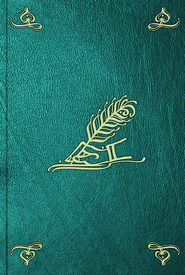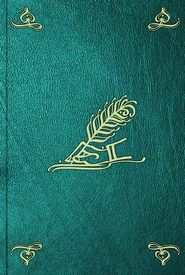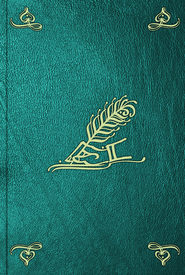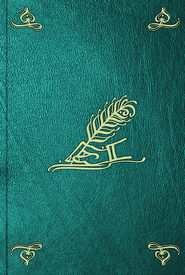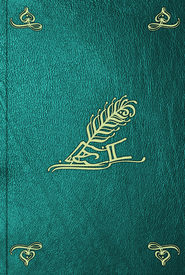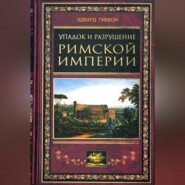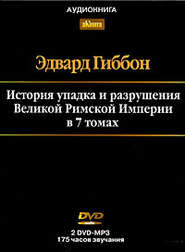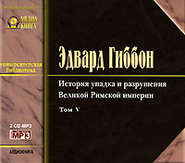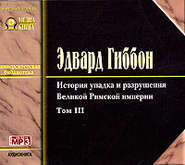По всем вопросам обращайтесь на: info@litportal.ru
(©) 2003-2025.
✖
Private Letters of Edward Gibbon (1753-1794) Volume 1 (of 2)
Настройки чтения
Размер шрифта
Высота строк
Поля
I forgot upon the study table some maps which I want to make up into an atlas. Will you be so good, Dear Madam, as to collect all the French or Latin loose maps in the study and send them to me by the first opportunity. Pray do not despise me so far as to give me no commissions.
I am, Dear Madam,
Most truly your's and my father's,
E. Gibbon.
49.
To J. B. Holroyd, Esq
Beriton, April 29th, 1767.
Dear Leger,
MARRIAGE OF MR. HOLROYD.
*I happened to-night to stumble upon a very odd piece of intelligence in the St. James's Chronicle; it relates to the marriage of a certain Monsieur Olroy,[Footnote_102_102 - The name was so spelt in the newspapers. John Baker Holroyd married in 1767 Miss Abigail Way, only daughter of Lewis Way, of Richmond, Surrey.] formerly Captain of Hussars. I do not know how it came into my head that this Captain of Hussars was not unknown to me, & that he might possibly be an acquaintance of yours. If I am not mistaken in my conjecture, pray give my compliments to him, & tell him from me, that I am at least as well pleased that he is married as if I were so myself. Assure him, however, that tho' as a Philosopher I may prefer celibacy, yet as a Politician I think it highly proper that the species should be propagated by the usual method; assure him even that I am convinced, that if celibacy is exposed to fewer miseries, marriage can alone promise real happiness, since domestick enjoyments are the source of every other good. May such happiness, which is bestowed on few, be given to him; the transient blessings of beauties, and the more durable ones of fortune, good sense, and an amiable disposition.
I can easily conceive, and as easily excuse you, if you have thought mighty little this winter of your poor rusticated friend. I have been confined ever since Christmas, and confined by a succession of very melancholy occupations. I was scarce got to Beriton, where I only proposed staying about a fortnight, when a brother of Mrs. Gibbon's died unexpectedly, tho' after a very long and painfull illness. We were scarce recovered from the confusion which such an event must produce in a family, when my father was taken dangerously ill, and with some intervalls has continued so ever since. I can assure you, my dear Holroyd, that the same event appears in a very different light when the danger is serious & immediate; or when, in the gayety of a tavern dinner, we affect an insensibility that would do us no great honor were it real. My father is now much better; but I have since been assailed by a severer stroke – the loss of a friend. You remember, perhaps, an Officer of our Militia, whom I sometimes used to compare to yourself. Indeed the comparaison would have done honor to any one. His feelings were tender and noble, and he was always guided by them: his principles were just and generous, and he acted up to them. I shall say no more, and you will excuse my having said so much, of a man you had not the least knowledge of; but my mind is just now so very full of him, that I cannot easily talk, or even think, of any thing else. If I know you right, you will not be offended at my weakness.
WITH THE MILITIA.
What rather adds to my uneasiness, is the necessity I am under of joining our Militia the day after to-morrow. Tho' the lively hurry of such a scene might contribute to divert my ideas, Yet every circumstance of it, and the place itself, (which was that of his residence,) will give me many a painful moment. I know nothing would better raise my spirits than a visit from you; the request may appear unseasonable, but I think I have heard you speak of an uncle you had at Southampton. At all events, I hope you will snatch a moment to write to me, and give me some account of your present situation & future designs. As you are now fettered, I should expect you will not be such a Hic et ubique,[Footnote_103_103 - The motto of the regiment of light dragoons, called Royal Foresters, in which Mr. Holroyd had been captain, and which was disbanded in 1763.] as you have been since your arrival in England. I stay at Southampton from the 1st to the 28th of May, & then propose making a short visit to town; If you are any where in the neighbourood of it, you may depend upon seeing me. I hope then to concert measures for seeing a little more of you next winter than I have lately done, as I hope to take a pretty long spell in town. I suppose the Goat[Footnote_104_104 - A nickname for Mr. Guise.] has often fallen in your way: He has never once wrote to me, nor I to him: in the Country we want materials, and in London we want time. I ought to recollect, that you even want time to read my unmeaning scrawl. Believe, however, my dear Leger, that it is the sincere expression of a heart entirely yours.*
E. Gibbon.
50.
To his Stepmother
Southampton,[Footnote_105_105 - At Southampton Gibbon attended every spring the monthly exercise of the militia, of which, by the resignation of his father and the death of Sir T. Worsley (1768), he eventually became lieutenant-colonel commandant.] May the 8th, 1767.
My birth-day. May I have many happy ones. Amen.
Dear Madam,
The post is really going out, at a most inconvenient hour, half after nine in the morning, and as usual I neglected writing the night before. All I can do now is to express the joy I received by your accounts of my father's improvement in point of health, and to return you some portion of joy, by telling you, that on Wednesday morning Mrs. Harrison was safely delivered of a boy. Both mother and child are in the fairest way – The bay horse is sold – the post chaise tempts one very much.
I am, Dear Madam,
Most truly yours,
The Major.
51.
To his Father
Newport, I. of W., December the 1st, 1767.
Dear Sir,
THE GENERAL ELECTION.
Here I am, and how much longer I may stay in this little island, Lord knows. Jemmy Worsley is still at Guernsey upon Election business. I have passed four or five days at Stenbury with only Sir Thomas, his son, and Jemmy's sister, rather quietly indeed than agreably. Last night we were summoned to Newport quite unexpectedly, & this morning Sir Thomas is gone to Newtown with three Lawyers in order to fix the boundaries of some borough lands; I expect him back to dinner, as it is the monthly club of the island, & I fear will be a drunken day. Upon the whole this is to me a very unpleasant scene, but I am engaged in it & I can scarce tell how to get away from it. The first step after the conveyances of my borough land are finished, is to oblige the Mayor (Holmes himself) to swear me in a burgess of Newtown; for the constitution of that borough is of a very mixed nature. Mandamus's for this purpose are every day expected from the King's bench; so that, should I leave the island pendente lite, I might be recalled the next day. It is however some comfort that my conscience will be less burthened than I expected. We were both mistaken as to that terrible oath which regards only freeholds in Counties.
As to our success or possibility of success you will excuse my entering into particulars, especially upon paper & by the post.[Footnote_106_106 - Parliament was dissolved March 11, 1768, and the elections took place in March. Gibbon seems to have assisted the Worsleys in the Isle of Wight against the Castle interest and that of the Holmes family. In 1586, when the Crown sought to create a parliamentary party in the House of Commons, six members were returned to Parliament by the three boroughs of Newport, Newtown, and Yarmouth, because in the Isle of Wight, through its military captain and governor, the influence of the Crown was paramount. Gradually the leading families of the island acquired control over the three boroughs, and at this period they were disputed by the Worsley, Barrington, and Holmes families, the latter being descended from Sir Robert Holmes, who took New York from the Dutch, and "first bewitched our eyes with Guinea gold." At the election of 1768 the following members were elected for the respective boroughs: – Newport: Hans Sloane, Esq., and John Eames, Esq., one of the Masters in Chancery. Newtown: Sir J. Barrington, Bart., and Harcourt Powell, Esq. (re-elected). Yarmouth: Jervoise Clarke, Esq., and William Strode, Esq.] In general we are sanguine, especially at Newtown. Affairs are incomparably well managed by the advantage of having a great lawyer acting for himself. He hurries things thro' the courts with a expedition that is rather uncommon in law proceedings. The ennemy contrived however to insert into our friend's advertisement a most curious quaere which you have probably seen. The printer will ask pardon or be prosecuted. Power as well as art is employed. Yesterday we learnt that Captain Lee, who refused to promise his vote, was turned out of the government of Carisbroke Castle, (ten shillings a day) and the place given to Captain Holmet. It seems to occasion a great outcry, and may perhaps do them more harm than good.
I am, Dear Sir,
Most truly your's and Mrs. Gibbon's,
E. G.
52.
To his Stepmother
London, April the 18th, 1768.
Dear Madam,
The reason I have delayed (besides the usual one) was the real scarcity of news either of a publick or a private nature. As to myself I got safe to town, and have lived there in my usual manner; the Romans,[Footnote_107_107 - A convivial club, meeting once a week, established by Gibbon and other travellers.] Boodle's,[Footnote_108_108 - Gibbon was a member of Boodle's Club, known as the Savoir vivre.] the Theatre and some acquaintances whom you already know. In all these places nothing new or interesting has occurred. Ranelagh[Footnote_109_109 - Ranelagh Gardens, now part of Chelsea Hospital Gardens, stood on the site of a villa belonging to Lord Ranelagh, the Jones of Grammont's Memoirs. The Rotunda, an amphitheatre, with an orchestra in the centre, surrounded by "balconies full of little alehouses," was opened to the public May 24, 1742. The last entertainment given there was the installation ball of the Knights of the Bath in 1802. The gardens were closed in 1803. A staple, fixed in one of the trees of the avenue, preserved, till a few years ago, the traditions of the glories of Ranelagh when the gardens were lighted by a thousand lamps.] is indeed opened. I was there last night for the first time. Notwithstanding the brilliancy of the first moment, I must own I think it very soon grows insipid to a by-stander, or by-walker if you like it better. I acknowledge it indeed the most convenient place for courtships of every kind. It is certainly the best market we have in England. Lord Abingdon[Footnote_110_110 - The Earl of Abingdon married, on June 7, 1768, the daughter of Admiral Sir Peter Warren.] is just going to make a pretty considerable purchase; of Miss Warren, Mrs. Fitzroy's sister. The Lord wants money, the Lady a title, so that as the bargain seems advantageous to both parties we apprehend it will speedily be concluded.
VOLTAIRE'S RUIN.
I will not trouble you with election news, as it is both dull and uncertain. I must however mention that I have seen Serjeant Glynn,[Footnote_111_111 - Serjeant Glynn, well known as the advocate of Wilkes, was afterwards elected as second member for Middlesex at a by-election. He married a daughter of Sir J. Oglander, of Nunwell, in the Isle of Wight, and had been an unsuccessful candidate for one of the Isle of Wight constituencies at the general election of 1768.] who is encouraged by the Sollicitor General[Footnote_112_112 - John Dunning, afterwards Lord Ashburton.] to pursue his petition, and who flatters himself that the Duke of B. will lend his weight, and that the D. of G. will stand neuter. He is strongly of opinion that Sir Thomas should be in town to make interest, and has intended for some time past to write to the Baronet who sleeps at Pilewell. The opponents (without intending anything) have already canvassed most of the members. Indeed there seems to be a general dislike to petitions (of which there never was known so great a number), and I think most of the returned members have a very good chance unless they are attacked by formidable men. Such is the case of Preston[Footnote_113_113 - Sir Peter Leycester and Sir Frank Standish were found, November 29, 1768, not duly elected.] fought by Lord Strange, and such I fear will be the case of Yarmouth; many people at least have a bad opinion both of our cause and of our interest.[Footnote_114_114 - The return for Yarmouth, I.W., was amended by order of the House of Commons, dated January 19th, 1769, by erasing the names of Jervoise Clarke and William Strode, and substituting those of George Lane Parker and Thomas Lee Dummer.] I do not think this can be called carrying the three boroughs in the isle of Wight. Northampton will be attacked and defended with great vigour and expence.[Footnote_115_115 - On February 14, 1769, Sir George Osborne was found not duly elected, and Thomas Howe was declared duly elected. The return of Sir George Rodney was held to be valid. A note by Sir Denis le Marchant, appended to Lord Orford's Memoirs, states that the expenses of the contest and petition cost Lord Spencer £70,000.] That will be the second act of Lord H.'s Tragi-Comi-farce. As Osborn & Rodney have exactly all the same votes, if Howe succeeds, there must be a new election of a second member, and in that case the two Noble Lords may probably quarrel about the man, which may compleat the third act of the said farce. I shall say nothing of Wilkes;[Footnote_116_116 - John Wilkes was expelled from the House of Commons in January, 1764, and outlawed in the following August. He returned to England in February, 1768, and was at the bottom of the poll for the City (March 23). He headed the poll for Middlesex, March 28, 1768. His outlawry was reversed as technically illegal by the Court of King's Bench in the same year; but his two convictions for republishing No. 45 of the North Briton, and the Essay on Woman, were affirmed, and he was sentenced to two years' imprisonment. He was expelled the House February 3, 1769; re-elected February 16 and expelled February 27; re-elected March 16 and expelled March 17. At the election on April 13 he polled 1147 votes to the 296 of Colonel Luttrell; but the House resolved (April 15) that the election of Wilkes was void, and Luttrell duly elected. He was discharged from his imprisonment in 1770.] every man has his story and his opinion, which mutually destroy each other. Wednesday will decide most of these disputes, and you may depend on my immediately writing some particulars of that great day. Lord B.'s tryal[Footnote_117_117 - Lord Baltimore was charged with decoying to his house a young milliner named Sarah Woodcock, and with rape. On February 12, 1768, he was committed for trial at the spring assizes at Kingston, and acquitted in the following March.] is not yet come out. I will take care to send it with La Princesse de Babylone,[Footnote_118_118 - "Il y a," writes Madame du Deffand to Walpole, speaking of La Princesse de Babylon (April 3, 1768), "quelques traits plaisants, mais c'est un mauvais ouvrage, et, contre son ordinaire, fort ennuyeux."] a new Romance of Voltaire which is a very agreable absurd trifle. A propos, poor Voltaire is almost ruined. He had intrusted most of his money to that expensive scoundrel the Duke of Wirtenbergh,[Footnote_119_119 - During Gibbon's stay at Lausanne in 1763, the duke, brother of the reigning duke, occupied a villa called La Chablière, a short distance from the town.] who paid him a much greater interest for it than anybody else would give. The Duke is ruined, the security worth nothing and the money vanished. Voltaire has dismissed several dependants who lived in his house, and even his niece Madam Denys, all with handsome presents; and keeps only a man and three maids, with Père Adam an old Jesuit that plays at chess with him from morning to night. I am really sorry for the poor old man; as he spent his fortune much better than he acquired it.
I hear Sir Simeon[Footnote_120_120 - Sir Simeon Stuart, Bart., M.P. for the county of Southampton, died in November, 1779.] is confined with the gout to Hartley. The reputation of his new Physician is quite ruined by it.
I am, Dear Madam,
Most truly your's & my father's,
E. Gibbon.
53.
To James Scott, Esq.[Footnote_121_121 - The bulk of the letters for the years 1768 and 1769 relate to the pecuniary affairs of the Gibbon family. Mr. Gibbon was the owner of estates at Maple Durham, in the parish of Beriton near Petersfield, at Lenborough in Buckinghamshire, and a house, garden, and lands at Putney. He had also inherited shares in the New River Company, and other investments. But he had for years lived beyond his income, and it was only to the wreck of this fortune that the historian succeeded in 1770.]
Beriton, December the 20th, 1768.
Dear Sir,
Some particular and very urgent reasons, oblige me as well in my own name as in those of my father, and Mrs. Gibbon, to request your immediate presence at Beriton. Your own interest is deeply concerned, but what (I am convinced) will be a much more powerfull inducement, you will have an opportunity of adding a most essential obligation to those which your friendship has already conferred on our Family. As we have now a very pressing occasion for your advice and assistance, we shall flatter ourselves with the hopes of seeing you Friday evening.
I am, Dear Sir,
With the truest regard,
Your most sincere Friend and obedient humble Servant,
Edward Gibbon, Junior.
54.
To his Father
January the 2nd, 1769.
I am, Dear Madam,
Most truly your's and my father's,
E. Gibbon.
49.
To J. B. Holroyd, Esq
Beriton, April 29th, 1767.
Dear Leger,
MARRIAGE OF MR. HOLROYD.
*I happened to-night to stumble upon a very odd piece of intelligence in the St. James's Chronicle; it relates to the marriage of a certain Monsieur Olroy,[Footnote_102_102 - The name was so spelt in the newspapers. John Baker Holroyd married in 1767 Miss Abigail Way, only daughter of Lewis Way, of Richmond, Surrey.] formerly Captain of Hussars. I do not know how it came into my head that this Captain of Hussars was not unknown to me, & that he might possibly be an acquaintance of yours. If I am not mistaken in my conjecture, pray give my compliments to him, & tell him from me, that I am at least as well pleased that he is married as if I were so myself. Assure him, however, that tho' as a Philosopher I may prefer celibacy, yet as a Politician I think it highly proper that the species should be propagated by the usual method; assure him even that I am convinced, that if celibacy is exposed to fewer miseries, marriage can alone promise real happiness, since domestick enjoyments are the source of every other good. May such happiness, which is bestowed on few, be given to him; the transient blessings of beauties, and the more durable ones of fortune, good sense, and an amiable disposition.
I can easily conceive, and as easily excuse you, if you have thought mighty little this winter of your poor rusticated friend. I have been confined ever since Christmas, and confined by a succession of very melancholy occupations. I was scarce got to Beriton, where I only proposed staying about a fortnight, when a brother of Mrs. Gibbon's died unexpectedly, tho' after a very long and painfull illness. We were scarce recovered from the confusion which such an event must produce in a family, when my father was taken dangerously ill, and with some intervalls has continued so ever since. I can assure you, my dear Holroyd, that the same event appears in a very different light when the danger is serious & immediate; or when, in the gayety of a tavern dinner, we affect an insensibility that would do us no great honor were it real. My father is now much better; but I have since been assailed by a severer stroke – the loss of a friend. You remember, perhaps, an Officer of our Militia, whom I sometimes used to compare to yourself. Indeed the comparaison would have done honor to any one. His feelings were tender and noble, and he was always guided by them: his principles were just and generous, and he acted up to them. I shall say no more, and you will excuse my having said so much, of a man you had not the least knowledge of; but my mind is just now so very full of him, that I cannot easily talk, or even think, of any thing else. If I know you right, you will not be offended at my weakness.
WITH THE MILITIA.
What rather adds to my uneasiness, is the necessity I am under of joining our Militia the day after to-morrow. Tho' the lively hurry of such a scene might contribute to divert my ideas, Yet every circumstance of it, and the place itself, (which was that of his residence,) will give me many a painful moment. I know nothing would better raise my spirits than a visit from you; the request may appear unseasonable, but I think I have heard you speak of an uncle you had at Southampton. At all events, I hope you will snatch a moment to write to me, and give me some account of your present situation & future designs. As you are now fettered, I should expect you will not be such a Hic et ubique,[Footnote_103_103 - The motto of the regiment of light dragoons, called Royal Foresters, in which Mr. Holroyd had been captain, and which was disbanded in 1763.] as you have been since your arrival in England. I stay at Southampton from the 1st to the 28th of May, & then propose making a short visit to town; If you are any where in the neighbourood of it, you may depend upon seeing me. I hope then to concert measures for seeing a little more of you next winter than I have lately done, as I hope to take a pretty long spell in town. I suppose the Goat[Footnote_104_104 - A nickname for Mr. Guise.] has often fallen in your way: He has never once wrote to me, nor I to him: in the Country we want materials, and in London we want time. I ought to recollect, that you even want time to read my unmeaning scrawl. Believe, however, my dear Leger, that it is the sincere expression of a heart entirely yours.*
E. Gibbon.
50.
To his Stepmother
Southampton,[Footnote_105_105 - At Southampton Gibbon attended every spring the monthly exercise of the militia, of which, by the resignation of his father and the death of Sir T. Worsley (1768), he eventually became lieutenant-colonel commandant.] May the 8th, 1767.
My birth-day. May I have many happy ones. Amen.
Dear Madam,
The post is really going out, at a most inconvenient hour, half after nine in the morning, and as usual I neglected writing the night before. All I can do now is to express the joy I received by your accounts of my father's improvement in point of health, and to return you some portion of joy, by telling you, that on Wednesday morning Mrs. Harrison was safely delivered of a boy. Both mother and child are in the fairest way – The bay horse is sold – the post chaise tempts one very much.
I am, Dear Madam,
Most truly yours,
The Major.
51.
To his Father
Newport, I. of W., December the 1st, 1767.
Dear Sir,
THE GENERAL ELECTION.
Here I am, and how much longer I may stay in this little island, Lord knows. Jemmy Worsley is still at Guernsey upon Election business. I have passed four or five days at Stenbury with only Sir Thomas, his son, and Jemmy's sister, rather quietly indeed than agreably. Last night we were summoned to Newport quite unexpectedly, & this morning Sir Thomas is gone to Newtown with three Lawyers in order to fix the boundaries of some borough lands; I expect him back to dinner, as it is the monthly club of the island, & I fear will be a drunken day. Upon the whole this is to me a very unpleasant scene, but I am engaged in it & I can scarce tell how to get away from it. The first step after the conveyances of my borough land are finished, is to oblige the Mayor (Holmes himself) to swear me in a burgess of Newtown; for the constitution of that borough is of a very mixed nature. Mandamus's for this purpose are every day expected from the King's bench; so that, should I leave the island pendente lite, I might be recalled the next day. It is however some comfort that my conscience will be less burthened than I expected. We were both mistaken as to that terrible oath which regards only freeholds in Counties.
As to our success or possibility of success you will excuse my entering into particulars, especially upon paper & by the post.[Footnote_106_106 - Parliament was dissolved March 11, 1768, and the elections took place in March. Gibbon seems to have assisted the Worsleys in the Isle of Wight against the Castle interest and that of the Holmes family. In 1586, when the Crown sought to create a parliamentary party in the House of Commons, six members were returned to Parliament by the three boroughs of Newport, Newtown, and Yarmouth, because in the Isle of Wight, through its military captain and governor, the influence of the Crown was paramount. Gradually the leading families of the island acquired control over the three boroughs, and at this period they were disputed by the Worsley, Barrington, and Holmes families, the latter being descended from Sir Robert Holmes, who took New York from the Dutch, and "first bewitched our eyes with Guinea gold." At the election of 1768 the following members were elected for the respective boroughs: – Newport: Hans Sloane, Esq., and John Eames, Esq., one of the Masters in Chancery. Newtown: Sir J. Barrington, Bart., and Harcourt Powell, Esq. (re-elected). Yarmouth: Jervoise Clarke, Esq., and William Strode, Esq.] In general we are sanguine, especially at Newtown. Affairs are incomparably well managed by the advantage of having a great lawyer acting for himself. He hurries things thro' the courts with a expedition that is rather uncommon in law proceedings. The ennemy contrived however to insert into our friend's advertisement a most curious quaere which you have probably seen. The printer will ask pardon or be prosecuted. Power as well as art is employed. Yesterday we learnt that Captain Lee, who refused to promise his vote, was turned out of the government of Carisbroke Castle, (ten shillings a day) and the place given to Captain Holmet. It seems to occasion a great outcry, and may perhaps do them more harm than good.
I am, Dear Sir,
Most truly your's and Mrs. Gibbon's,
E. G.
52.
To his Stepmother
London, April the 18th, 1768.
Dear Madam,
The reason I have delayed (besides the usual one) was the real scarcity of news either of a publick or a private nature. As to myself I got safe to town, and have lived there in my usual manner; the Romans,[Footnote_107_107 - A convivial club, meeting once a week, established by Gibbon and other travellers.] Boodle's,[Footnote_108_108 - Gibbon was a member of Boodle's Club, known as the Savoir vivre.] the Theatre and some acquaintances whom you already know. In all these places nothing new or interesting has occurred. Ranelagh[Footnote_109_109 - Ranelagh Gardens, now part of Chelsea Hospital Gardens, stood on the site of a villa belonging to Lord Ranelagh, the Jones of Grammont's Memoirs. The Rotunda, an amphitheatre, with an orchestra in the centre, surrounded by "balconies full of little alehouses," was opened to the public May 24, 1742. The last entertainment given there was the installation ball of the Knights of the Bath in 1802. The gardens were closed in 1803. A staple, fixed in one of the trees of the avenue, preserved, till a few years ago, the traditions of the glories of Ranelagh when the gardens were lighted by a thousand lamps.] is indeed opened. I was there last night for the first time. Notwithstanding the brilliancy of the first moment, I must own I think it very soon grows insipid to a by-stander, or by-walker if you like it better. I acknowledge it indeed the most convenient place for courtships of every kind. It is certainly the best market we have in England. Lord Abingdon[Footnote_110_110 - The Earl of Abingdon married, on June 7, 1768, the daughter of Admiral Sir Peter Warren.] is just going to make a pretty considerable purchase; of Miss Warren, Mrs. Fitzroy's sister. The Lord wants money, the Lady a title, so that as the bargain seems advantageous to both parties we apprehend it will speedily be concluded.
VOLTAIRE'S RUIN.
I will not trouble you with election news, as it is both dull and uncertain. I must however mention that I have seen Serjeant Glynn,[Footnote_111_111 - Serjeant Glynn, well known as the advocate of Wilkes, was afterwards elected as second member for Middlesex at a by-election. He married a daughter of Sir J. Oglander, of Nunwell, in the Isle of Wight, and had been an unsuccessful candidate for one of the Isle of Wight constituencies at the general election of 1768.] who is encouraged by the Sollicitor General[Footnote_112_112 - John Dunning, afterwards Lord Ashburton.] to pursue his petition, and who flatters himself that the Duke of B. will lend his weight, and that the D. of G. will stand neuter. He is strongly of opinion that Sir Thomas should be in town to make interest, and has intended for some time past to write to the Baronet who sleeps at Pilewell. The opponents (without intending anything) have already canvassed most of the members. Indeed there seems to be a general dislike to petitions (of which there never was known so great a number), and I think most of the returned members have a very good chance unless they are attacked by formidable men. Such is the case of Preston[Footnote_113_113 - Sir Peter Leycester and Sir Frank Standish were found, November 29, 1768, not duly elected.] fought by Lord Strange, and such I fear will be the case of Yarmouth; many people at least have a bad opinion both of our cause and of our interest.[Footnote_114_114 - The return for Yarmouth, I.W., was amended by order of the House of Commons, dated January 19th, 1769, by erasing the names of Jervoise Clarke and William Strode, and substituting those of George Lane Parker and Thomas Lee Dummer.] I do not think this can be called carrying the three boroughs in the isle of Wight. Northampton will be attacked and defended with great vigour and expence.[Footnote_115_115 - On February 14, 1769, Sir George Osborne was found not duly elected, and Thomas Howe was declared duly elected. The return of Sir George Rodney was held to be valid. A note by Sir Denis le Marchant, appended to Lord Orford's Memoirs, states that the expenses of the contest and petition cost Lord Spencer £70,000.] That will be the second act of Lord H.'s Tragi-Comi-farce. As Osborn & Rodney have exactly all the same votes, if Howe succeeds, there must be a new election of a second member, and in that case the two Noble Lords may probably quarrel about the man, which may compleat the third act of the said farce. I shall say nothing of Wilkes;[Footnote_116_116 - John Wilkes was expelled from the House of Commons in January, 1764, and outlawed in the following August. He returned to England in February, 1768, and was at the bottom of the poll for the City (March 23). He headed the poll for Middlesex, March 28, 1768. His outlawry was reversed as technically illegal by the Court of King's Bench in the same year; but his two convictions for republishing No. 45 of the North Briton, and the Essay on Woman, were affirmed, and he was sentenced to two years' imprisonment. He was expelled the House February 3, 1769; re-elected February 16 and expelled February 27; re-elected March 16 and expelled March 17. At the election on April 13 he polled 1147 votes to the 296 of Colonel Luttrell; but the House resolved (April 15) that the election of Wilkes was void, and Luttrell duly elected. He was discharged from his imprisonment in 1770.] every man has his story and his opinion, which mutually destroy each other. Wednesday will decide most of these disputes, and you may depend on my immediately writing some particulars of that great day. Lord B.'s tryal[Footnote_117_117 - Lord Baltimore was charged with decoying to his house a young milliner named Sarah Woodcock, and with rape. On February 12, 1768, he was committed for trial at the spring assizes at Kingston, and acquitted in the following March.] is not yet come out. I will take care to send it with La Princesse de Babylone,[Footnote_118_118 - "Il y a," writes Madame du Deffand to Walpole, speaking of La Princesse de Babylon (April 3, 1768), "quelques traits plaisants, mais c'est un mauvais ouvrage, et, contre son ordinaire, fort ennuyeux."] a new Romance of Voltaire which is a very agreable absurd trifle. A propos, poor Voltaire is almost ruined. He had intrusted most of his money to that expensive scoundrel the Duke of Wirtenbergh,[Footnote_119_119 - During Gibbon's stay at Lausanne in 1763, the duke, brother of the reigning duke, occupied a villa called La Chablière, a short distance from the town.] who paid him a much greater interest for it than anybody else would give. The Duke is ruined, the security worth nothing and the money vanished. Voltaire has dismissed several dependants who lived in his house, and even his niece Madam Denys, all with handsome presents; and keeps only a man and three maids, with Père Adam an old Jesuit that plays at chess with him from morning to night. I am really sorry for the poor old man; as he spent his fortune much better than he acquired it.
I hear Sir Simeon[Footnote_120_120 - Sir Simeon Stuart, Bart., M.P. for the county of Southampton, died in November, 1779.] is confined with the gout to Hartley. The reputation of his new Physician is quite ruined by it.
I am, Dear Madam,
Most truly your's & my father's,
E. Gibbon.
53.
To James Scott, Esq.[Footnote_121_121 - The bulk of the letters for the years 1768 and 1769 relate to the pecuniary affairs of the Gibbon family. Mr. Gibbon was the owner of estates at Maple Durham, in the parish of Beriton near Petersfield, at Lenborough in Buckinghamshire, and a house, garden, and lands at Putney. He had also inherited shares in the New River Company, and other investments. But he had for years lived beyond his income, and it was only to the wreck of this fortune that the historian succeeded in 1770.]
Beriton, December the 20th, 1768.
Dear Sir,
Some particular and very urgent reasons, oblige me as well in my own name as in those of my father, and Mrs. Gibbon, to request your immediate presence at Beriton. Your own interest is deeply concerned, but what (I am convinced) will be a much more powerfull inducement, you will have an opportunity of adding a most essential obligation to those which your friendship has already conferred on our Family. As we have now a very pressing occasion for your advice and assistance, we shall flatter ourselves with the hopes of seeing you Friday evening.
I am, Dear Sir,
With the truest regard,
Your most sincere Friend and obedient humble Servant,
Edward Gibbon, Junior.
54.
To his Father
January the 2nd, 1769.







